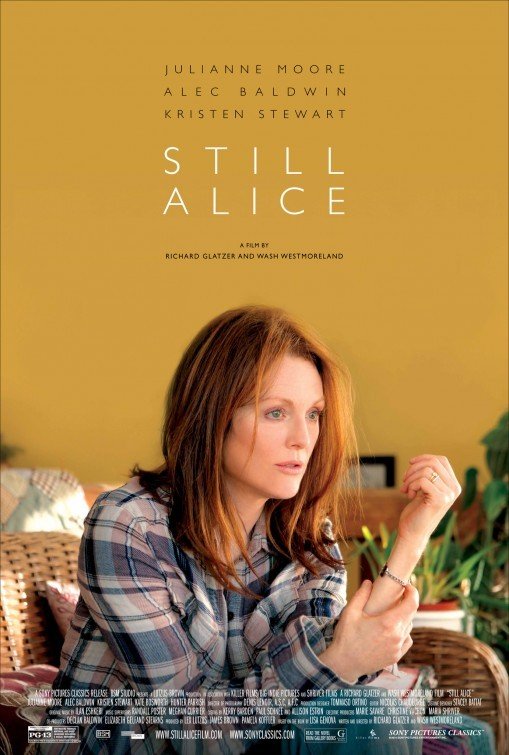“Struggling with Alzheimer’s”

| None | Light | Moderate | Heavy | |
|---|---|---|---|---|
| Language | ||||
| Violence | ||||
| Sex | ||||
| Nudity |
What You Need To Know:
Based on a well-researched novel by Lisa Genova, STILL ALICE has many emotional, heartbreaking scenes, with an excellent, impressive performance by Julianne Moore as Alice. However, the story as a whole is a bit episodic, but the last scene does show that love can prevail, even though the scene seems somewhat anticlimactic. STILL ALIVE also has some strong foul language and an attempted suicide scene. So, extreme caution is advised.
Content:
(B, C, PaPa, LL, V, S, A, D, MM) Light moral, redemptive worldview showing love can prevail, despite the debilitating disease of Alzheimer’s, but in an anti-climactic, quiet way, and there’s a Christmas scene, but marred by some immoral or questionable decisions including an attempted suicide, conflicted emotions, and the need for some characters to leave as the title character’s condition worsens; six obscenities (including one “f” word), three GDs and eight light profanities such as OMG, plus Alzheimer’s victim accidentally urinates herself when she forgets where the bathroom is; no depicted violence, but an attempt to commit suicide fails, but the movie’s attitude toward the suicide seems ambiguous and noncommittal on the issue; a crude verbal reference to oral sex and a light reference to protagonist’s marital relationship; no nudity; alcohol use; smoking; and, movie seems to have ambiguous attitude about Alzheimer’s victim’s failed suicide attempt, mother and daughter argue about daughter’s career plans, and some strains on a family show when mother gets an increasingly severe case of Alzheimer’s Disease.
More Detail:
The movie opens with Dr. Alice Howland celebrating her 50th birthday with her family, including her husband, two daughters and a son. Alice is a leading expert in the field of linguistics, the systematic study of language. At one point during the celebration, however, she seems to forget a word, but quickly recovers. Then, during one of her classes at Columbia University, she again forgets a word, but her recovery is not so fast this time out.
Alice consults her doctor, and he gives her a couple memory tests, a CAT scan and then another scan. Finally, he delivers his diagnosis: Alice is suffering from a case of “early onset” Alzheimer’s Disease, which is hereditary. Apparently, she got the disease from her father, who was an alcoholic.
So, now, not only does she and her family have to cope with her own disease, her three children have to be tested for the disease as well. It turns out that her son doesn’t have the genetic markers for the disease, but her oldest daughter does. Meanwhile, her youngest daughter, a struggling actress in Los Angeles, didn’t want to see the results of her test.
As the disease quickly affects Alice’s memory, her relationships with her family begin to change in unexpected ways. Will love prevail?
Based on a well-researched novel by Lisa Genova, STILL ALICE has many emotional, heartbreaking scenes, with an excellent, impressive performance by Julianne Moore as Alice. However, the story as a whole is a bit episodic, but the last scene does show that love can prevail, even though the scene seems somewhat anticlimactic.
Also, at one point, the movie shows Alice recording a video for her own use instructing her to take some pills hidden in a drawer and commit suicide. Though the plan doesn’t work out, the two scenes revealing the plan and its outcome may lead some viewers to think suicide or even euthanasia is an acceptable way out for people with such a terrible disease. The movie is noncommittal in these scenes. It just matter-of-factly shows what happens. So, the movie seems ambiguous about the issue of suicide in the case of a debilitating disease like Alzheimer’s. Those who are taught that suicide is never an option probably will be less affected by these two scenes, than those who haven’t been taught anything about such issues, and even less than those who have been taught that suicide is sometimes an option or up to the individual person. The movie should have been clearer and less ambiguous.
STILL ALICE also contains some strong foul language. So, taking everything into consideration, both the good aspects and the bad ones, extreme caution is advised.


 - Content:
- Content: 




